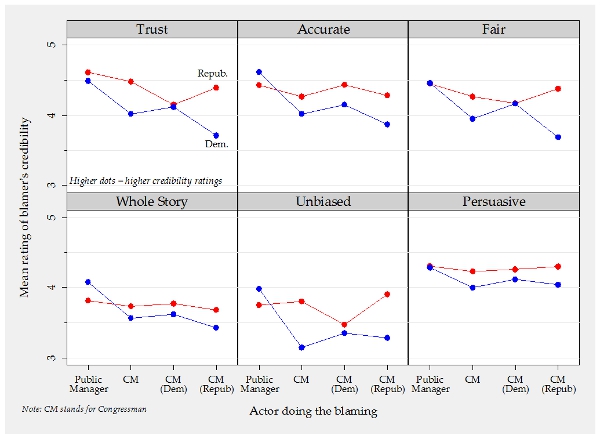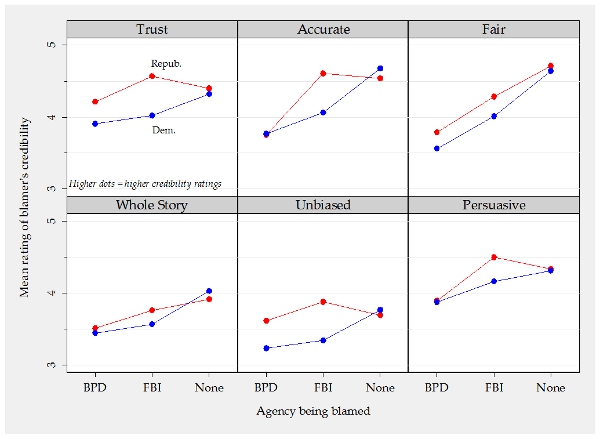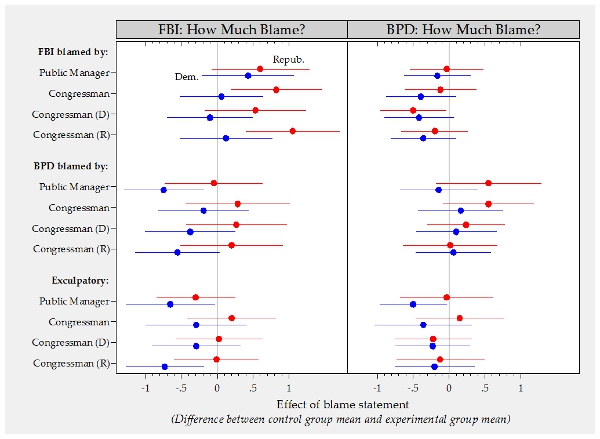 When things go wrong, such as when disasters and other crises occur, politicians often look to assign blame in order to gain political capital. But how do members of the public react when politicians and public servants apportion blame? Using the April 2013 Boston Marathon bombings as a case study, John Marvel finds that an individual’s sense of who is to blame depends on who is doing the blaming, and who is being blamed. He argues that such ‘blame games’ can have an effect on which government policy responses people are willing to support to address future crises.
When things go wrong, such as when disasters and other crises occur, politicians often look to assign blame in order to gain political capital. But how do members of the public react when politicians and public servants apportion blame? Using the April 2013 Boston Marathon bombings as a case study, John Marvel finds that an individual’s sense of who is to blame depends on who is doing the blaming, and who is being blamed. He argues that such ‘blame games’ can have an effect on which government policy responses people are willing to support to address future crises.
In the aftermath of natural disasters, acts of terrorism, and other public crises, politicians and policymakers inevitably look to avoid and assign blame. The United States’ current Ebola scare is a prime example. As Republicans blame President Obama and the Centers for Disease Control and Prevention (CDC) for not doing enough to contain the disease, Democrats blame Republicans for cutting CDC funding. The April 2013 Boston Marathon bombings offer a more one-sided example. Following the bombings, numerous Republicans in Congress blamed the Federal Bureau of Investigation for failing to preemptively act on information about the bombings’ perpetrators.
These “blame games” are problematic for two related reasons. First, participants’ motives are primarily political and not practical: Politicians engage in blame games to make their opponents look bad rather than to find workable solutions to real problems. Second, participants’ accusations can initiate a chain reaction in which the end result is bad public policy: Blame games influence citizens’ beliefs about which government actors are responsible for whatever failure, if any, has occurred. These beliefs, in turn, affect citizens’ attitudes about potential policy responses, which influence the policy responses that politicians are willing to publicly support. Finally, these policy responses, which might include such things as funding changes for government programs or organizational restructuring, have crucial implications for our government’s capacity to address future crises.
In a recent study, I conducted an experiment on a sample of 840 United States adults to examine the first link in this chain. Specifically, I tested whether blame statements made by political actors and high-level public administrators influenced subjects’ beliefs about which government agencies were culpable for failing to prevent the Boston Marathon bombings. I did this by randomly assigning subjects to read one of twelve fictionalized blame statements in which a specific actor blames a specific agency. These blame statements differed in two ways. First, the person doing the blaming was either (1) a “non-cued” congressman (a congressman whose party was not revealed), (2) a democratic congressman, (3) a republican congressman, or (4) a high-level public safety manager. Second, the agency being blamed was either (1) the Boston Police Department (BPD), (2) the Federal Bureau of Investigation, or (3) no agency was blamed (exculpatory statement). Each of the twelve blame statements was a unique combination of “blamer” and “blamee.” After reading a blame statement, subjects rated the blamer’s credibility and answered questions about the culpability of the Boston Police Department and the Federal Bureau of Investigation.
My theory was that a high-level public manager would be viewed as more credible than a congressman, and so blame statements made by a high-level public manager would be more influential than blame statements made by a congressman. The results, which I summarize below, paint a more complicated picture.
To measure blamers’ credibility, I asked subjects to rate the blame statements they read along six dimensions: (1) whether they could be trusted or not, (2) whether they were accurate or inaccurate, (3) whether they were fair or unfair, (4) whether they “told the whole story” or did not tell the whole story, (5) whether they were biased or unbiased, and (6) whether they were persuasive or unpersuasive. Figure 1 plots means for the six credibility dimensions listed above, by blamer and by subjects’ party identification—blue dots represent means for democratic subjects; red dots represent means for republican subjects. The results shown in Figure 1 are mostly consistent with my theory that public managers will be viewed as more credible than politicians. Among Democrats, mean ratings are clearly higher for my experiment’s public manager than its non-cued congressman on all six credibility dimensions. Among Republicans, by contrast, five of six mean ratings are higher for the public manager than the non-cued political actor, but the difference is small in all cases. These results suggest that public managers enjoy a higher credibility advantage among Democrats than Republicans.
Figure 1 – Mean credibility ratings, by actor making blame statement and subjects’ party identification

Figure 2 plots means for the same six credibility dimensions, this time by the agency being blamed rather than the actor doing the blaming. This allows me to assess the credibility of the blame statements’ content, controlling for the actor making the statement. A few patterns are clear in Figure 2. First, subjects—both Democrats and Republicans—tend to view blame statements as least credible when they implicate the Boston Police Department. Second, Democrats clearly view blame statements that implicate no agency as most credible: on all six dimensions, the mean Democratic rating for exculpatory statements is higher than the mean Democratic rating for BPD- or FBI-implicating blame statements. Third, Republicans tend to view blame statements that implicate the FBI as most credible: the mean Republican rating for FBI blame statements is highest on four of six dimensions.
Figure 2: Mean credibility ratings, by agency being blamed and subjects’ party identification

After measuring blamers’ credibility, I asked subjects how much blame they thought the FBI and Boston Police Department deserved for failing to prevent the Boston Marathon bombings. Potential answer choices ranged from 1 = none to 5 = all. Figure 3 plots the effects of my experiment’s 12 blame statements on this how much blame variable, where an effect is simply the difference between my control group’s mean (subjects in the control group did not read a blame statement) and a given experimental group’s mean. A dot’s horizontal bars represent 95% confidence intervals, and so if these bars do not cross zero, the plotted effect is statistically significant at an alpha of 0.05.
Figure 3: Effects of blame statements on how much blame subjects attribute to the FBI and BPD

Figure 3’s results suggest that FBI-implicating blame statements are more influential than BPD-implicating and exculpatory statements among Republicans. Though only two of the four Republican FBI effects are statistically significant, all are positive and sizable, indicating that Republicans who read FBI-implicating blame statements attribute more blame to the FBI. Among Republicans and Democrats, none of the BPD-implicating blame statements has a statistically significant effect on the amount of blame attributed to the BPD, consistent with my earlier finding that neither Republicans nor Democrats view blame statements that implicate the BPD as credible.
Again consistent with my credibility findings, public managers making exculpatory statements affect the amount of blame that Democrats attribute to the FBI and BPD. For instance, Democrats who read an exculpatory statement from my public manager actor assign about 0.7 fewer units of blame to the FBI than control group Democrats. Similarly, Democrats who read an exculpatory statement from my public manager actor assign about 0.6 fewer units of blame to the BPD than control group democrats.
From a public policy standpoint, my results are simultaneously discomfiting and encouraging. They are discomfiting because they suggest that individuals’ notions of who is to blame are malleable: blame statements clearly caused individuals to alter their attitudes regarding government’s culpability for failing to prevent the Boston Marathon bombings. On the other hand, individuals do not appear to evaluate blame statements totally uncritically. Individuals uniformly view BPD-implicating blame statements as lacking credibility, and, for the most part, this shows up in their blame attributions. Nevertheless, given that blame statements do appear to affect citizens’ beliefs about who is to blame for failing to prevent or contain public crises, it is important for blame game participants’ to bear in mind that their game-playing may have real policy consequences.
This article is based on the paper ‘The Boston Marathon Bombings: Who’s to Blame and Why It Matters for Public Administration’ in Public Administration Review.
Featured image credit: J E Theriot (Flickr, CC-BY-2.0)
Please read our comments policy before commenting.
Note: This article gives the views of the author, and not the position of USApp– American Politics and Policy, nor of the London School of Economics.
Shortened URL for this post: http://bit.ly/1z0BcLc
_________________________________
 John Marvel – George Mason University
John Marvel – George Mason University
John Marvel is an assistant professor in the School of Policy, Government, and International Affairs at George Mason University. His research focuses on public management issues, including public sector employee turnover, public sector work motivation, and manager-employee relationships in public sector organizations. He also does work on public opinion, focusing on how citizens react to public and private sector performance failures and successes differently.



